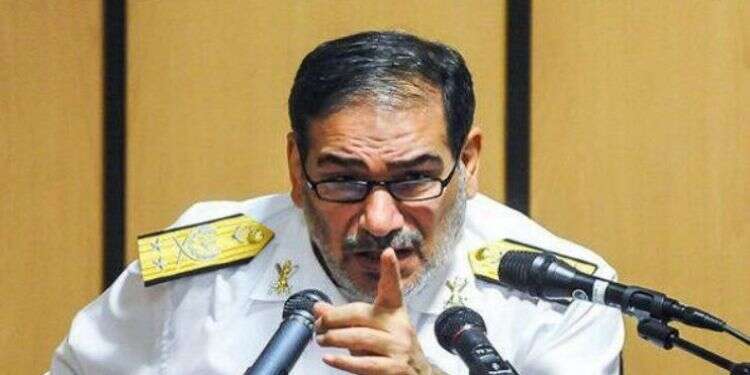A senior Iranian official threatened Sunday that if Israel attacked Tehran over its nuclear program, the Islamic republic's response would be devastating and would require the Jewish state to spend "tens of thousands of billion dollars" to rehabilitate the country.
Follow Israel Hayom on Facebook and Twitter
Tweeting in English, Hebrew, and Persian, Head of the Supreme National Security Council of Iran Ali Shamkhani was apparently commenting on reports that the Israeli government has appropriated 5 billion shekels for a potential military option against Iran's nuclear program.
According to Channel 12 News, the move includes funds for advance aircraft, intelligence-gathering drones, and unique weapons necessary for a potential strike against fortified underground nuclear sites.
Instead of allocating 1.5 billion dollars budget for atrocities against #Iran, the Zionist regime should focus on providing tens of thousands of billion dollars funding to repair the damage that is going to be caused by Iran's shocking response.
— علی شمخانی (@alishamkhani_ir) October 24, 2021
The Islamic republic insists that its nuclear efforts are strictly for civilian and peaceful purposes, but Israeli intelligence shows that these endeavors have clear military dimensions. Given the ayatollahs repeated threats to annihilate the Jewish state, Israel deems Iran to be an existential threat and has stated that it will not allow it to become a nuclear threshold state.
"Instead of allocating 1.5 billion dollars budget for atrocities against #Iran, the Zionist regime should focus on providing tens of thousands of billion dollars funding to repair the damage that is going to be caused by Iran's shocking response," Shamkhani said Shamkhani in his English tweet.
The Hebrew tweet carried a similar message.
במקום להקצות 1.5 מיליארד דולר נגד איראן, #ישראל חושבת להתכונן לעשרות מיליארדי דולרים כדי לבנות מחדש את הנזק שנגרם על ידי תגובתו של #איראן
— علی شمخانی (@alishamkhani_ir) October 24, 2021
World powers, led by the US, have been trying to revive the 2015 nuclear deal, rendered hollow by Iran's repeated violations of its principles and the fact that the Trump administration pulled out of the accord in 2018.
While the Vienna negotiations were showing some progress, they came to a halt in June, with the election of Iranian President Ebrahim Raisi, an ultraconservative cleric who has said he would relish a conflict with the West.
On Sunday, International Atomic Energy Agency Director-General Rafael Grossi admitted that the watchdog's efforts to monitor Iran's nuclear program are no longer "intact."
He warned that Tehran's refusal to cooperate with the IAEA on the repair of cameras damaged in an alleged Israeli strike on a centrifuge parts production site in the TESA Complex in Karaj in July meant that the agency cannot account for what the Iranians have been doing there.
Subscribe to Israel Hayom's daily newsletter and never miss our top stories!
According to Grossi, another cause for concern was the fact that he has been unable to establish any type of direct communication with officials in Raisi's government since he came to power.
"I have never spoken to the new foreign minister," Grossi told NBC. "I hope to be able to have the opportunity to meet with him soon because it's very important … so when there is a problem when there is a misunderstanding when there is a disagreement, we can talk about it."
i24NEWS contributed to this report.




